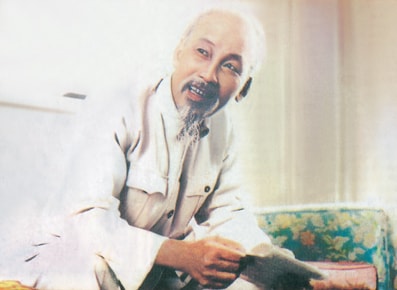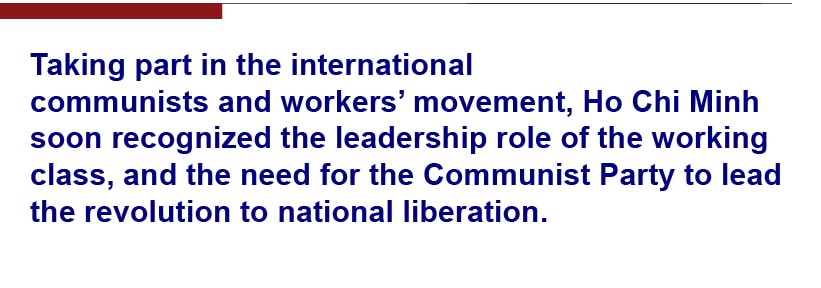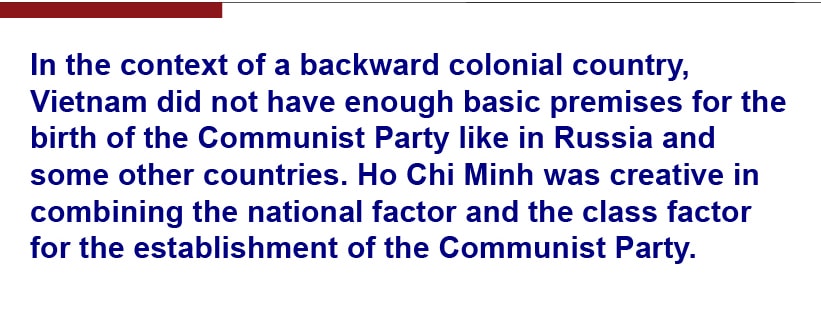The Marxist - Leninist theory on the Communist Party had been going through the forming and developing process with its basic attributes as the revolutionary and scientific nature; required communists to master it in practice and at the same time to know how to apply it creatively to each country’s historical conditions. Lenin instructed that, “We not at all regard Marx’s theory as something fully completed and inviolable; in the contrary, we believe that it has only laid the foundation for a science that the socialists need to further develop it in all aspects, if they do not want to lag behind life.”(1)
 |
Ho Chi Minh’s creations in establishing the Communist Party of Vietnam |
In his revolutionary life, Ho Chi Minh thoroughly grasped Lenin’s above instructions and adopted them in many creative ways. As early as 1924, he stated: “Marx has built his theory on a certain philosophy of history, but which history? It is European history. And what is Europe? It does not represent the whole human race... To review Marxism on its historical basis, to reinforce it with Oriental ethnology. Those are the tasks that the Soviets should undertake (Our colony division has just received an invitation to participate in this work)”(2)
In Ho Chi Minh’s thoughts, the views of building the Communist Party in a colonial country so that it could lead the cause of national liberation is an extremely important viewpoint formed when he came to know Marxism - Leninism, by which he determined the right path for national salvation. From patriotism, he came to Marxism - Leninism, from a patriot, he became a communist soldier, and he volunteered to stand in the ranks of the communists, striving for communist goals and ideals. He participated in founding the French Communist Party and worked at the Communist International. Taking part in the international communists and workers’ movement, Ho Chi Minh soon recognized the leadership role of the working class, and the need for the Communist Party to lead the revolution to national liberation. As K. Marx and F. Engels pointed out, “in their struggle against the combined power of the propertied classes, only when the proletariat can organize themselves into an independent political party in opposition to all the existing propertied classes, can they then act as a class”(3). In the 1920s, in some articles about Lenin and the Communist International, Ho Chi Minh repeatedly asserted the needs to establish the Communist Party based on the Marxist - Leninist theory in the colonies. In his work “The Revolutionary Path”, he stated, “What is the first thing a revolution should have? First, it must have a revolutionary party, so that internally, it will mobilize and organize the people, and externally it will contact with the oppressed peoples and the proletariat everywhere. Only when the Party is firm can the revolution be successful, like only when the helmsman is skillful can his boat ride well”(4)

The Communist Party is the vanguard of the working class. The working class nature of the Party is specifically manifested in the fields of politics, ideology and organization. It should be tightly organized on the principle of democratic centralism; the Party must be united and unanimous and take self-criticism and criticism as its development law and must be disciplined. That is the fundamental principle of the Marxist - Leninist theory on communist party construction that was creatively applied by Ho Chi Minh to the founding of the Communist Party of Vietnam. He confirmed the most decisive factor in building the Party as follows: “For a Party to be strong, it should be based on a doctrine as the core and all the members of the Party should understand and follow it. A Party with no doctrine is like a person who has no intelligence or a ship that lacks a compass. Nowadays, there are many theories and doctrines, but the most genuine; firmest and most revolutionary doctrine is Leninism”(5). However, according to Ho Chi Minh, while taking the Marxism - Leninism as the “core”, the Party must not be dogmatic, avoid mechanical imitation, but should understand its scientific and revolutionary nature in order to apply it creatively to the specific conditions of each country and nation, and must come up with sound revolutionary policies.
Preparing for the establishment of the Communist Party in Vietnam, a colonial country, Ho Chi Minh paid attention to theory and the model of organization. Being a member of the French Communist Party and working at the Communist International, he directly learnt about the Communist Party of the Soviet Union, the Communist Party of China and other brotherly Communist Parties, and acquired a lot of knowledge and experience, at the same time, he paid attention to the Oriental human and social nature to apply the principles of Lenin in building a new type party into Vietnam.
According to the principles of Marxism - Leninism, the birth of the Communist Party was a product of the combination of Marxism - Leninism and the workers’ movement. Only the workers’ movement itself would lead to the establishment of the Communist Party, which was pointed out by Lenin: “The history of all countries attests that, by its forces only, the working class can only attain the consciousness of unionism”(6). In the conditions of Vietnam and other colonies, Ho Chi Minh assumed that the nature of the Communist Party was not only decided by the social background of all the workers, but also by their sense of political thoughts and their adoption of the path of Marxism - Leninism.

In the context of a backward colonial country, Vietnam did not have enough basic premises for the birth of the Communist Party like in Russia and some other countries. Ho Chi Minh was creative in combining the national factor and the class factor for the establishment of the Communist Party. The national factor was patriotism, and the class factor was Marxism - Leninism and the workers’ movement. In the situations when the Vietnamese working class had not developed in number for the organization of a Communist Party, he emphasized the spread of Marxism - Leninism in the workers’ movement and the patriotic movement in Vietnam. Accordingly, a true party cannot be held isolated and closed, but must be closely and organically linked with the nation and the class, must represent the struggle of the nation and the class, must be the nucleus in the leadership and in uniting the nation and the class, and must represent the class and the nation. This view was demonstrated in his writing The Revolutionary Path, and earlier, in 1924, he asserted that: “Nationalism is a major driving force of the country”(7).
By organizing the Vietnam Revolutionary Youth Association composed of young educated patriots, he spread Marxism - Leninism in the workers’ movement and the patriotic movement in Vietnam. These two movements strongly absorbed Marxism - Leninism and bringing about a qualitative change, became the revolutionary action of social classes and strata in Vietnam. The Association was appropriate to the circumstances of Vietnam at the time. In fact, this organization undertook the task of making political, ideological and organizational preparations for the birth of the Communist Party of Vietnam. The method of spreading of Marxism - Leninism in the workers and patriotism movement of Vietnam marked Ho Chi Minh’s creativity on this path to the establishment of the Party.
Patriotism is a precious tradition of the people of Vietnam. Patriotic movement in Vietnam was perceived by Ho Chi Minh, introduced by him as a constituent element of the Communist Party of Vietnam. However advanced the workers’ movement might be, unless it was otherwise closely connected with and became the core of the patriotic movement, it would not stand firm in the nation, and would not be able to lead the cause of national liberation to victory.
In the light of Marxism - Leninism, Ho Chi Minh saw clearly that, in the new era, the patriotic movement in Vietnam was able to absorb Marxism - Leninism.
Because in the Manifesto of the Communist Party, Marx and Engels also pointed out that the proletariat class, even in different country and nation, is international by nature; and the enemy of the revolution of each country, after all, is an international force by nature. But the revolution would take place within a nation and a country, so first and foremost, the proletariat class must decide by itself the fate of its nation, “first of all, to seize the power, to try to become the national class and to turn itself into a nation“(8). So the targeted audiences to which Ho Chi Minh would spread Marxism - Leninism were not only the working class, but also the Vietnamese patriots.
The 1927 - 1929 period was the transformation period of Vietnam revolution. The Vietnamese workers’ movement strongly moved from being spontaneous into voluntary and the patriotic movement developed to a new quality. This fact showed that Marxism-Leninism and Ho Chi Minh’s revolutionary ideas, via the Vietnam Revolutionary Youth Association, had really penetrated into the entire workers’ and patriots’ movements creating a strong wave of national revolution and democracy and ripe conditions for the birth of the Communist Party of Vietnam. After thorough political, ideological and organizational preparations, Ho Chi Minh founded the Communist Party of Vietnam in the early 1930s. Later, he summed them up into an important theoretical point: Marxism - Leninism combined with the workers’ movement and the patriotic movement led to the establishment of the Communist Party of Vietnam. Combining the national element and the class element in the establishment of the Communist Party of Vietnam was the outstanding creation of Ho Chi Minh.
The documents making up “the First Platform of the Party (Brief Political Platform, Brief Tactics) drafted by Ho Chi Minh and approved at the Party founding conference (1930) defined: “The Party assembles the mass of peasants to prepare for the land revolution and to overthrow the feudalists and landlords. It liberates workers and farmers from capitalism yoke. It attracts the petty bourgeoisie, intellectuals and middle peasants toward the proletariat class; it assembles or attracts rich farmers, the bourgeoisie and medium-sized capitalists to defeat counter-revolutionary parties... “(9). He analyzed clearly that: “Indigenous capitalists have no power; we should not let them side with the imperialists”(10). The policy of involving all social classes and strata, including the nationalist bourgeoisie into the national united front against imperialism and feudalism was a creation by Ho Chi Minh. Because he understood well the situation of Vietnam and fully appreciated their positive aspects in the cause of national liberation.
To mobilize all the forces in the nation, Ho Chi Minh emphasized the vanguard and leading role of the Communist Party. The vanguard character of the Party, according to him, is represented by a sound political guideline. He stated clearly: “The Party is the vanguard of the proletarian army comprised mostly of workers and makes them be capable of leading the masses” (11)
In his Appeal on the occasion of the Founding of the Party, Ho Chi Minh also stated: “The Communist Party of Vietnam has been established. It is the Party of the proletariat. The Party will guide the proletariat to lead the An Nam revolution in the struggle to liberate all the oppressed and exploited people”(12). In the documents approved at the Party founding Conference as well as in his articles, his letters to the Party Central Committee and the Communist International in the 1930s, Ho Chi Minh used a lot of words like: “to win the hearts”, “to attract”, to contact”, “to guide”, etc, in order to confirm the vanguard and leading role of the Party in the organization, mobilization, and uniting the nation to fight for the interests of the nation itself and various classes.
In the first Political Program, he “advocated to carry out a bourgeois democratic revolution and land revolution to advance to a communist society... Overthrowing French imperialism and the feudalists. Gaining complete independence for Vietnam”(13). This is a kind of proletarian revolution in colonies, which, during the lifetime, Marx, Engels, Lenin and even the Communist Internationals had not ever mentioned; this was a continuity of two interrelated and interacted revolutionary strategies. “To advance to a communist society” was the target of the “bourgeois democratic revolution.” This revolution was a prerequisite to advance to the “communist society”, and there was no gap between them; there would be no need for undertaking the second political revolution to solve the problem of power like in the case of the Russian revolution and in some other countries. Obviously, Ho Chi Minh set the task of national liberation while not distancing from the standpoint of the working class. This was a sound and radical policy for which he had been consistently preparing for quite a long time, reflecting his unique creativity in establishing the Communist Party of Vietnam.
He showed one more creativity in naming the Party and solving the issue related to the Party within the framework of each Indochinese country, while the Communist International gave instructions on establishing a common Communist Party for all three Indochinese countries. In the discussion at the Party founding Conference, Ho Chi Minh explained: “The name Indochina would be quite vast, and according to the principles of Marxism - Leninism, the ethnic issue is a very serious one; one cannot force other nations to join the Party, because that is contrary to the principle of Leninism. And the name An Nam was too narrow, and Vietnam has three regions: the North, the Centre, and the South. Thus, the name Vietnam is suitable to all three regions and is not contrary to the principles of Marxism - Leninism on ethnic issues”(14), thus the Conference shared this interpretation and named the Party “the Communist Party of Vietnam”. His policy complied with Marxist - Leninist principles of building a new type of party, taking into consideration the ethnic factor, in order to awaken people to national consciousness, kindle the strength of the three Indochinese nations, while generating a political credibility to unite and support each other voluntarily, equally and effectively. The creations of Ho Chi Minh in founding the Communist Party in Vietnam as a colonial country was verified by the actual situation of the Vietnamese and the world revolution in the twentieth century as appropriate and scientific. This is an important contribution of Ho Chi Minh to the Marxist - Leninist theoretical treasure.
The above arguments show Ho Chi Minh’s creativity in his drive for the establishment of the Communist Party of Vietnam. This Party, founded and trained by President Ho Chi Minh, has had more than 80 years of striving to build itself to maturity; it has been overcoming numerous difficulties and challenges, and with the bravery of a genuine revolutionary party that is always closely connected with the people, it has led and organized the whole Party and people and promoted their great strength in winning many great victories.
Beside the achievements, there still exist many limitations and shortcomings which if not rectified will be the challenge for the leadership of the Party and the survival of the institution in Vietnam. One of the shortcomings and weaknesses is that a not small part of Vietnamese officials and Party members, including those who are in the leadership and management positions, including some senior officials, show different signs of degeneration in ideology, morality and lifestyle. To make drastic changes in the near future, it is necessary for the Party to implement the solutions set forth in the Resolution of the 4th Plenum of the 11th Party Central Committee in order to build the Party into a truly revolutionary, pure, strong, “civilized and virtuous Party” worthy of the trust and expectations of all its members and of the people, and deserves to be the Party founded and trained by President Ho Chi Minh.
Assoc. Prof., Dr. LE VAN YEN
National Political Publishing House
Further reading:
(1) Lenin: Complete Works, vol.4, Progress Publishing House, Moscow, 1976, p.232.
(2), (7) Ho Chi Minh: Complete Works, vol.1, National Political Publishing House, Hanoi, 2009, p.465, 466.
(3), (4) op. cit., vol.2, p. 267, 268.
(5) Lenin: Complete Works, op. cit., vol.6, p.38.
(6) Karl Marx - F. Engels: Complete Works, vol.4, National Political Publishing House, Hanoi, 1995, p.624.
(8), (9), (10), (11) Ho Chi Minh: Complete Works, op. cit., vol.3, p. 4, 4, 10, 1.
(12) The Issue of Uniting Communist Organizations, archived document at the Institute of Vietnam Communist Party History.